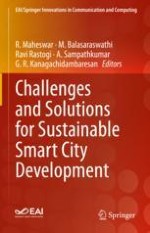Abstract
Generation of waste is an essential part of ecological cycle and is found in every element of ecosystem. With an increase in population and an expansion in urbanization, waste production has become area centric. In addition, the developments in technology and luxury appliances to meet the demands of this urban population have increased multiple types of solid waste which differ in composition and their ability to decompose. For example, recently we have seen an increase in medical waste, e-waste, and also chemical waste which had not been there before three decades. Hence waste management becomes an important responsibility of all the stakeholders producing waste and authorities handling human locale and ecosystem. Waste management refers to a waste collection system, including its transportation, disposal, or reusing, and it must be effectively handled to avoid its undesirable effect on the health and the environment.
Increase in urbanization, especially in developing countries like India, accounts for most of the irregularities in governance since the infrastructure, human resources, and facilities have not been preplanned for the rapid increase. According to the Census of India report in 2011, the urban population crossed 377 million accounting for 31% of the total population. According to Kumar and Gaikwad (2004), the rate of urbanization increases if the urban population exceeds 25% of total population. This in turn can produce a sharp rise in waste generation also, which in fact is corroborated by the data collected on the municipal solid waste (MSW). With generation of 133,760 tons of municipal solid waste per day, it is very much essential for us to go smart for both collection and treatment since the former is only 68.14% and the latter is a mere 19.35% of generation. Cities top the list in generation per capita in India with 0.17 kg in small towns compared to 0.62 kg in cities.
With the prediction toward more increase in population, this is expected only to increase and not decrease in any way. With India’s MSW management still in landfill methods, it is going to be difficult to be efficient in waste management even in the near future. It is essential for us to turn to technology for waste management immediately. For example, the wastes we are creating every day can be converted into something good, such as electricity, heat, or fuel. In addition, the administration of the waste in different environments like rural and urban can be effectively planned with the help of technology. Internet of Things has been used in governance of waste management systems in advanced countries, right from the waste collection and classification to waste transformation, thus creating an effective recycling and connected systems across utilities.
This chapter discusses the types of waste, waste generation, and waste management with a difference in rural and urban environment and the various considerations connected with both. In addition, the various technologies used for the different steps in waste management of the different types of waste have been elaborately discussed.
Objectives
1.
To identify the differences in technology and the standards used in waste collection and waste management methods based on environment
2.
To propose an effective and connected IoT-based waste management model to be implemented across the community utility systems covering the various kinds of waste generated
